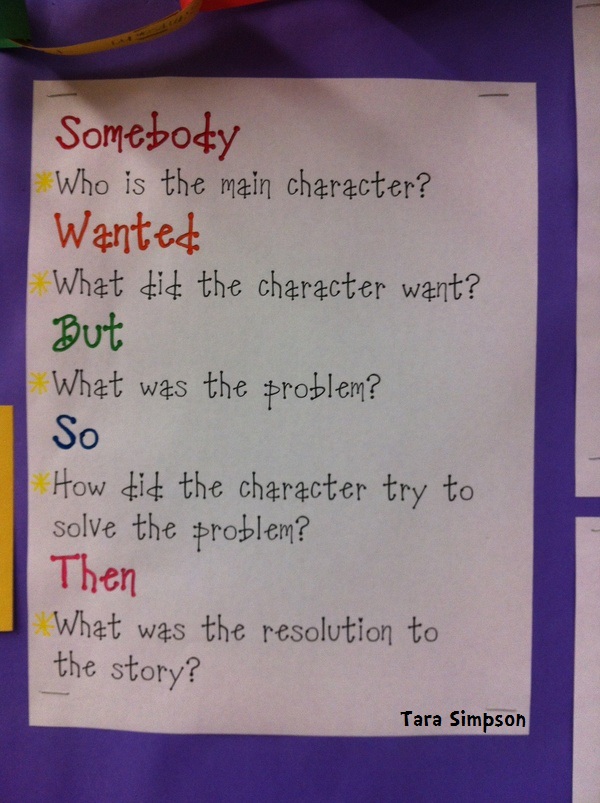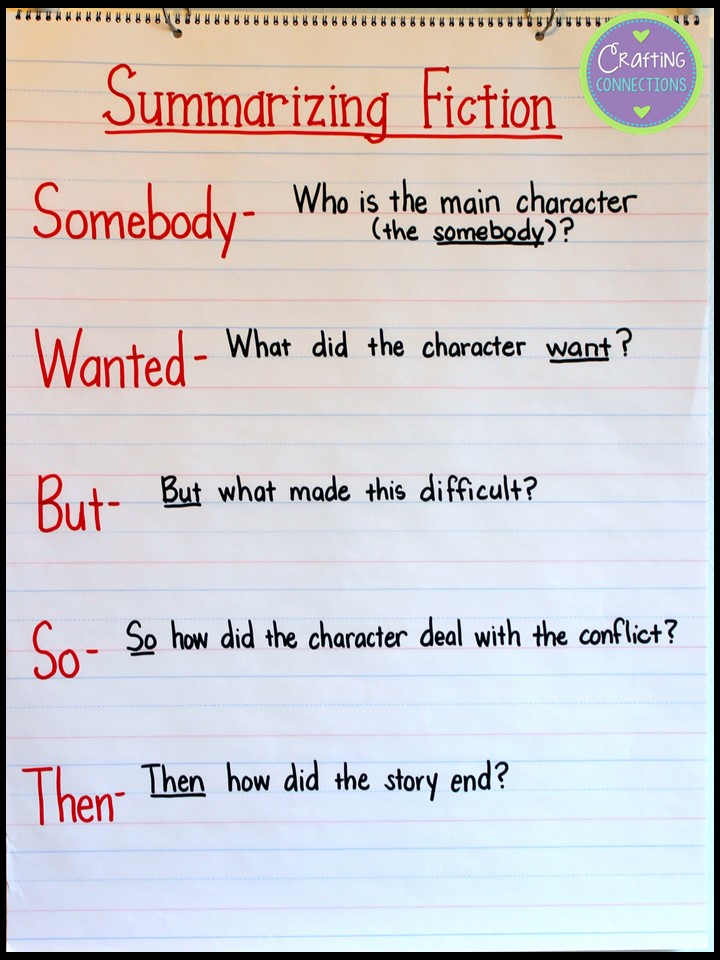
Tara Teaches Writing Review Board
Somebody-Wanted-But-So One of the hardest things for young children to understand is the difference between retelling and summarizing. While a retell is a detailed "play by

Summarizing Fiction... Somebody Wanted But So Then Crafting Connections
Somebody Wanted But So Then, or SWBST, is a tool to summarize fiction and nonfiction texts. The SWBST technique maps a plot or events through character, motivation, conflict, and resolution. Using SWBST gives a brief overview of the plot of a story. Writers can use SWBST to outline their plots.

Anchor Charts, Esl Teaching Resources, Gingerbread Man, Solving, Grade
SWBST Anchor Chart. Amie Farrington. This can be used as an anchor chart for your class or as a worksheet for students! , Reading Strategies, Spring. nd. Activities, Graphic Organizers, Centers. Portable Network Graphics. Reading Anchor Chart Headings BILINGUAL FREEBIE. Gonzales Bilingual Adventures.

Summarizing Using the Somebody Wanted But So Then Strategy
As for the times when the SWBST strategy fell short, I eventually came to the conclusion that at those times, students can start by applying the SWBST strategy, but that it's also okay to add in critical information that might not fit into the "formula".. As students share, I would write their answers on the anchor chart, leaving space.

FREE Summary Writing SWBST strategy printables. Click on the pin to
Quick! Grab the anchor chart & marker and write "SWBST" in giant block letters! Summarizing with SWBST For creating summaries of fictional texts, teach your students the SWBST strategy. You're probably familiar with the acronym, but here's a quick review of what each letter represents: "S" - Somebody This is the main character in the story.

Summarizing Fiction Texts (SWBST) Swbst, Summary anchor chart, Swbst
SWBST is an effective strategy to help students remember all the components needed to summarize a story and these bright posters are the perfect way to bring attention to a much needed skill. Included: 5 colored anchor charts (Somebody, Wanted, But, So, Then) 5 black & white anchor charts (Somebody, Wanted, But, So, Then)
Summarizing Freebie Funnel
Cut-Out Icons for Anchor Chart Somebody. Wanted. But. So. Then. S O M E B O D Y WANTED T SO . . . THEN THEN © 2012 Smekens Education Solutions, Inc.
Summarize Stories with Somebody, Wanted, But, So, Then
How to use the FREE SWBST anchor chart and printables in your classroom. Using anchor charts in my classroom has always been one of my favorite strategies.

17 Best images about SWBST on Pinterest Summary anchor chart
Step 1: I Do Model the 'Somebody Wanted But So Then' strategy by reading a selection of text aloud or retelling an event - this could be a story, film or real life event. Complete the SWBST five column chart. Example: Step 2: We Do Read aloud a second text selection or retell an event. Ask students to identify the Somebody from the event.

SWBST Anchor Chart
Anchor Charts to Help Students Break Down & Organize Their Thinking Note-taking Anchor Charts.. While many classrooms are moving toward the SWBST method, I prefer the three-sentence format because it more closely aligns with what kids see on state testing and it can work for fiction & nonfiction texts.
Release responsibility to the students during the cycle
The Somebody-Wanted-But-So (SWBS) format is a great scaffold for guiding students to give a summary NOT a retell. In K-2 classrooms we can help our young readers learn how to summarize by using the SBWS strategy. Since I am not "in the classroom" anymore.

SWBST Summary Writing YouTube
Summarizing Using the SWBST Strategy Before beginning, you need to know what each part of the strategy represents. Somebody - Who is the main character? Wanted - What did this character want? But - What was the problem? So - How was the problem solved? Then - What happened at the end?
Swbst Anchor Chart BEST
The rising action are the 2-3 events that help the reader understand the problem or conflict going on in the story. Climax. The climax is the most exciting part of the story. It is usually the big event that you won't forget. Falling Action. The falling action are the 1-2 events that happen after the climax.

7 Summary Activities You'll Love for Students 2 Summary activities
Once you've selected your mentor text, a great way to practice is to have an anchor chart with the SWBST elements in front of your students. Keep this chart through several stories, and place sticky notes with the answers for each element in the columns that represent these elements. This way your students have an example to constantly refer.

Writing school, School reading, Teaching writing
6 Followers Follow Description Reviews 1 Q&A More from SimpleTeaching Description Use this SWBST anchor chart during guided reading, small groups, with individual students, or display it on your projector when teaching summarizing. Total Pages Answer Key N/A Teaching Duration N/A Report this resource to TPT

17 Best images about SWBST on Pinterest Summary anchor chart
SWBST Anchor Chart Another strategy for recounting and retelling stories is the "SWBST" or "Somebody Wanted But So Then" summary. Label your paper down the side with the letters SWBST. I like to leave room for sticky notes on the left so that we can practice the strategy again and again.